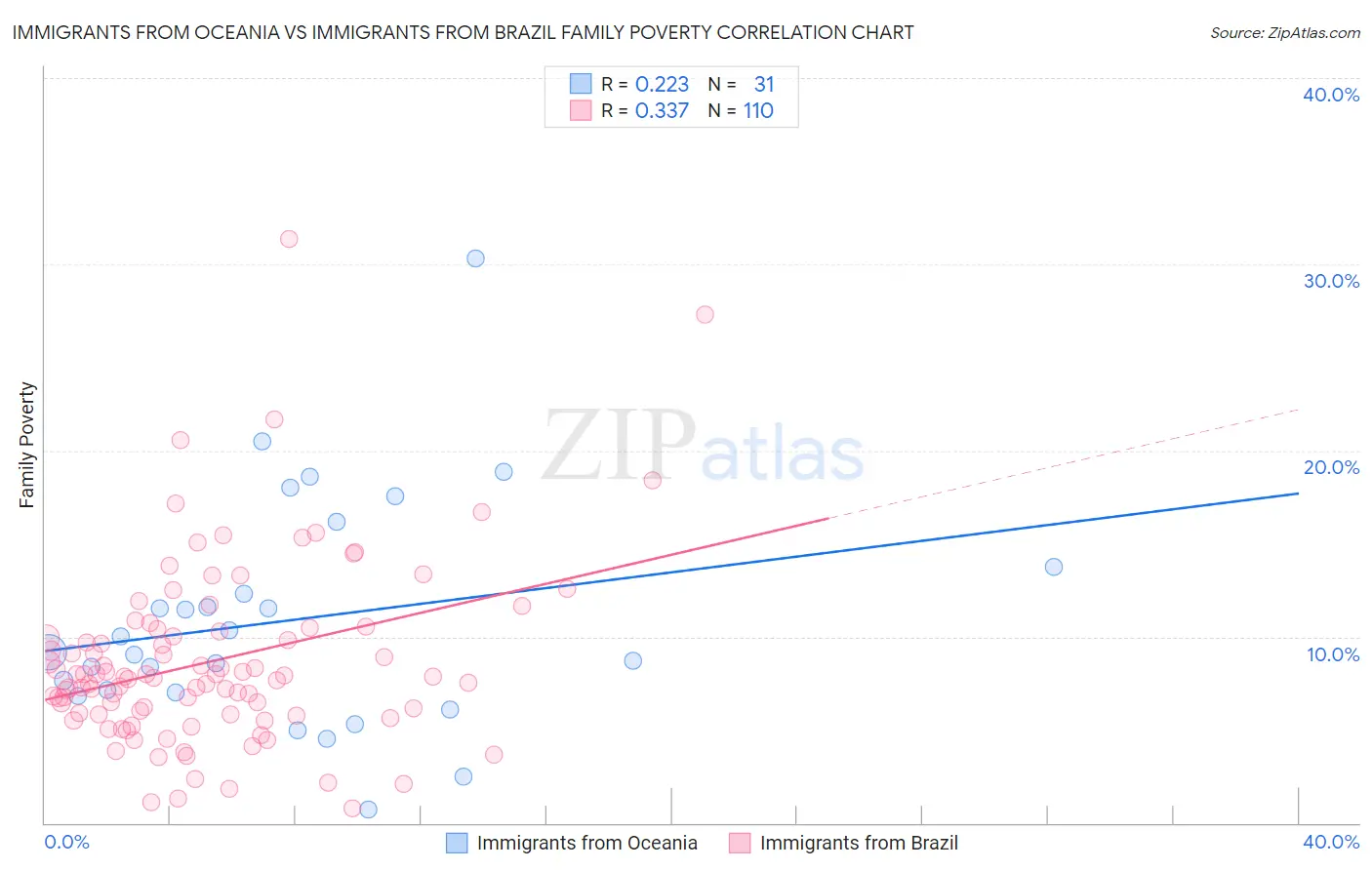Immigrants from Oceania vs Immigrants from Brazil Family Poverty
COMPARE
Immigrants from Oceania
Immigrants from Brazil
Family Poverty
Family Poverty Comparison
Immigrants from Oceania
Immigrants from Brazil
8.7%
FAMILY POVERTY
71.2/ 100
METRIC RATING
156th/ 347
METRIC RANK
8.5%
FAMILY POVERTY
86.3/ 100
METRIC RATING
136th/ 347
METRIC RANK
Immigrants from Oceania vs Immigrants from Brazil Family Poverty Correlation Chart
The statistical analysis conducted on geographies consisting of 304,831,685 people shows a weak positive correlation between the proportion of Immigrants from Oceania and poverty level among families in the United States with a correlation coefficient (R) of 0.223 and weighted average of 8.7%. Similarly, the statistical analysis conducted on geographies consisting of 342,227,050 people shows a mild positive correlation between the proportion of Immigrants from Brazil and poverty level among families in the United States with a correlation coefficient (R) of 0.337 and weighted average of 8.5%, a difference of 3.3%.

Family Poverty Correlation Summary
| Measurement | Immigrants from Oceania | Immigrants from Brazil |
| Minimum | 0.73% | 0.81% |
| Maximum | 30.3% | 31.4% |
| Range | 29.6% | 30.6% |
| Mean | 10.9% | 8.7% |
| Median | 9.1% | 7.8% |
| Interquartile 25% (IQ1) | 7.0% | 5.9% |
| Interquartile 75% (IQ3) | 13.8% | 10.3% |
| Interquartile Range (IQR) | 6.7% | 4.4% |
| Standard Deviation (Sample) | 6.1% | 4.9% |
| Standard Deviation (Population) | 6.0% | 4.9% |
Demographics Similar to Immigrants from Oceania and Immigrants from Brazil by Family Poverty
In terms of family poverty, the demographic groups most similar to Immigrants from Oceania are Immigrants from Kuwait (8.7%, a difference of 0.40%), Immigrants from Vietnam (8.7%, a difference of 0.74%), Immigrants from Spain (8.6%, a difference of 1.5%), Samoan (8.6%, a difference of 1.6%), and Brazilian (8.6%, a difference of 1.7%). Similarly, the demographic groups most similar to Immigrants from Brazil are Immigrants from Southern Europe (8.5%, a difference of 0.080%), Armenian (8.5%, a difference of 0.48%), Immigrants from Nepal (8.5%, a difference of 0.60%), Immigrants from Kazakhstan (8.5%, a difference of 0.62%), and Immigrants from Ukraine (8.5%, a difference of 0.66%).
| Demographics | Rating | Rank | Family Poverty |
| Immigrants | Brazil | 86.3 /100 | #136 | Excellent 8.5% |
| Immigrants | Southern Europe | 86.0 /100 | #137 | Excellent 8.5% |
| Armenians | 84.6 /100 | #138 | Excellent 8.5% |
| Immigrants | Nepal | 84.2 /100 | #139 | Excellent 8.5% |
| Immigrants | Kazakhstan | 84.1 /100 | #140 | Excellent 8.5% |
| Immigrants | Ukraine | 83.9 /100 | #141 | Excellent 8.5% |
| Yugoslavians | 83.5 /100 | #142 | Excellent 8.5% |
| Immigrants | Germany | 83.3 /100 | #143 | Excellent 8.5% |
| Albanians | 83.3 /100 | #144 | Excellent 8.5% |
| Immigrants | South Eastern Asia | 83.2 /100 | #145 | Excellent 8.5% |
| Immigrants | Belarus | 83.2 /100 | #146 | Excellent 8.5% |
| Immigrants | Jordan | 83.0 /100 | #147 | Excellent 8.5% |
| Scotch-Irish | 82.2 /100 | #148 | Excellent 8.6% |
| Mongolians | 80.4 /100 | #149 | Excellent 8.6% |
| Syrians | 80.3 /100 | #150 | Excellent 8.6% |
| Brazilians | 80.1 /100 | #151 | Excellent 8.6% |
| Samoans | 79.8 /100 | #152 | Good 8.6% |
| Immigrants | Spain | 79.1 /100 | #153 | Good 8.6% |
| Immigrants | Vietnam | 75.4 /100 | #154 | Good 8.7% |
| Immigrants | Kuwait | 73.6 /100 | #155 | Good 8.7% |
| Immigrants | Oceania | 71.2 /100 | #156 | Good 8.7% |